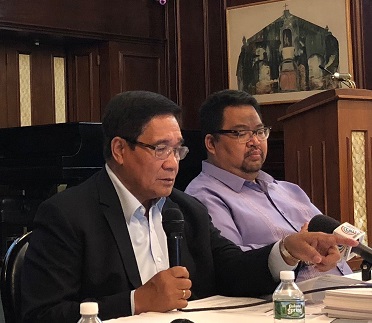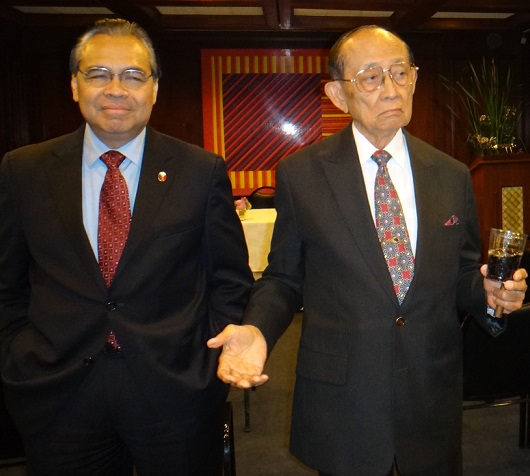Manila has no capability to ward off China: PHL national security chief

National Security Adviser Hermogenes Esperon (left) at the focus group discussion with Deputy Consul General Kerwin Tate. The FilAm Photo
It was a candid focus group discussion between National Security Adviser Hermogenes Esperon Jr. and members of the Filipino American community and the media. He indicated the Philippines is too weak to fend off China in their protracted feud over the West Philippine Sea and said Manila has no choice but to “constructively” engage with Beijing.
“We have no submarine, all our neighbors have submarines,” said Esperon. At the time of the 2012 Scarborough Shoal standoff – where the Philippine Navy took into custody eight Chinese fishermen and held their fishing boats – he said Manila had only two frigates. China brought 160 frigates.
“Do you want to engage China militarily?” he asked rhetorically. “That is what others want.”
He continued: “Do we fight a war or take the diplomatic route?” He said the Philippines does not have the capability “to ward off China,” and would rather “engage China constructively.”
He said the government of Rodrigo Duterte is using diplomatic and other initiatives in dealing with China, one of the several countries with overlapping claims over the South China Sea. The others are Brunei, Taiwan, and Vietnam. The South China Sea is a vital waterway for international trade with up to $5 trillion passing through its waters, Esperon said.
The Philippines has a consultative mechanism with China to raise issues over the disputed area, he added, but, “We are not noisy about what we are doing.” He said the Philippines needs to increase spending on its military to 2 percent of its GDP, from the current 1.1 percent, so it can defend its territory and sovereignty.
According to the United Nations Conference on Trade and Development, about 80 percent of global trade and 70 percent by value is transported by sea. Of that volume, some one third of global shipping goes through the South China Sea.
Under the previous government of Benigno ‘Noynoy’ Aquino 3rd, the Philippines filed and won its case at the Hague against China’s expansive claims in the South China Sea. Beijing dismissed the ruling and refused to take part in the deliberations of the case. China is a signatory to the U.N. Conference on the Law of the Sea, which does not recognize historic rights, the basis of Beijing’s claims to places like Scarborough Shoal and the Spratlys.
The Duterte administration changed tack and decided to cultivate China, with President Rodrigo Duterte calling the country a “true friend” in the hope of reaching an accommodation with Beijing.
Criticism of the Duterte government’s posture flared anew in 2018 when the Chinese coast guard in Scarborough Shoal seized the best catch of Filipino fishermen. Esperon downplayed that incident. He said the matter was brought up in consultations with China, which is investigating the incident.
He said the Philippines is upgrading its assets in the area by rehabilitating its airstrip on Pagasa island near Palawan and stepping up assistance for its fishermen. Using regional bodies and talks with China, the Philippines is looking to proclaim more Marine Protected Areas to conserve the fisheries in the region so all countries can benefit.
Esperon, who attended recent talks between Foreign Secretary Alan Cayetano and U.S. Secretary of State Mike Pompeo in Washington, said the U.S. has made it clear it will not assist the Philippines in case of hostilities with China in the West Philippine Sea. Under the mutual defense treaty between Manila and Washington, the U.S. will only come to the aid of the Philippines if any part of its territory is attacked by another power.
But Esperon said the Kalayaan Island Group, which is a municipality of Palawan, is “not part of” the area covered by the treaty. The Chinese buildup of its military capabilities in the disputed area is “subject to diplomatic action,” he explained.
The only way to go forward on the issue is to bolster a Philippine military that does not have fighter jets or even a submarine, or at least the Coast Guard.
“It is not in our interest to control the South China Sea,” he said. “We must slowly create our capabilities.”
© The FilAm 2018











